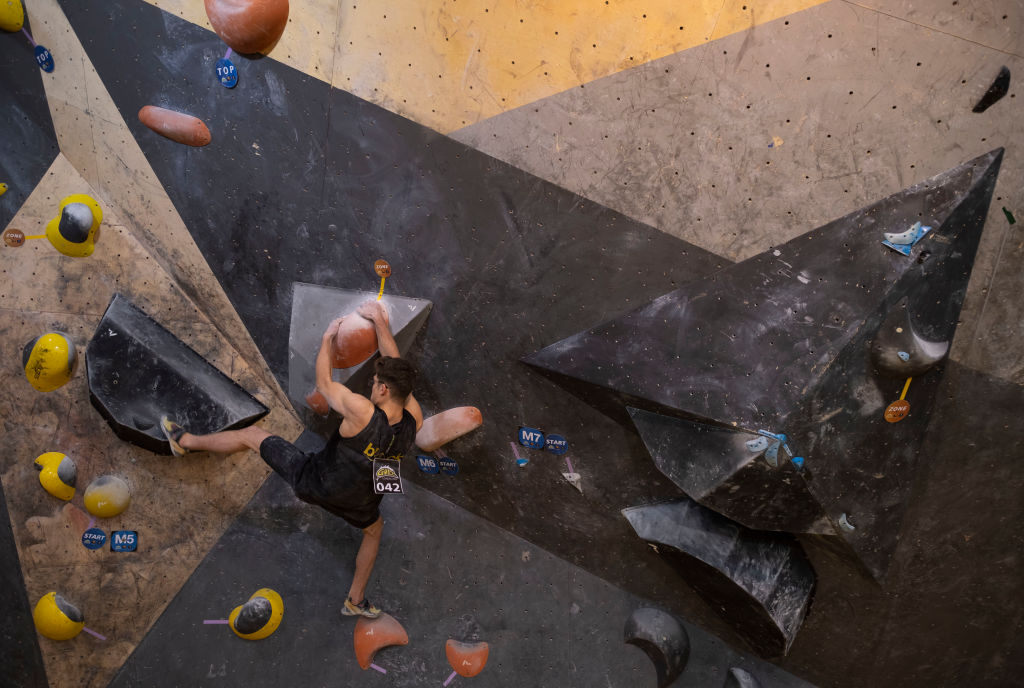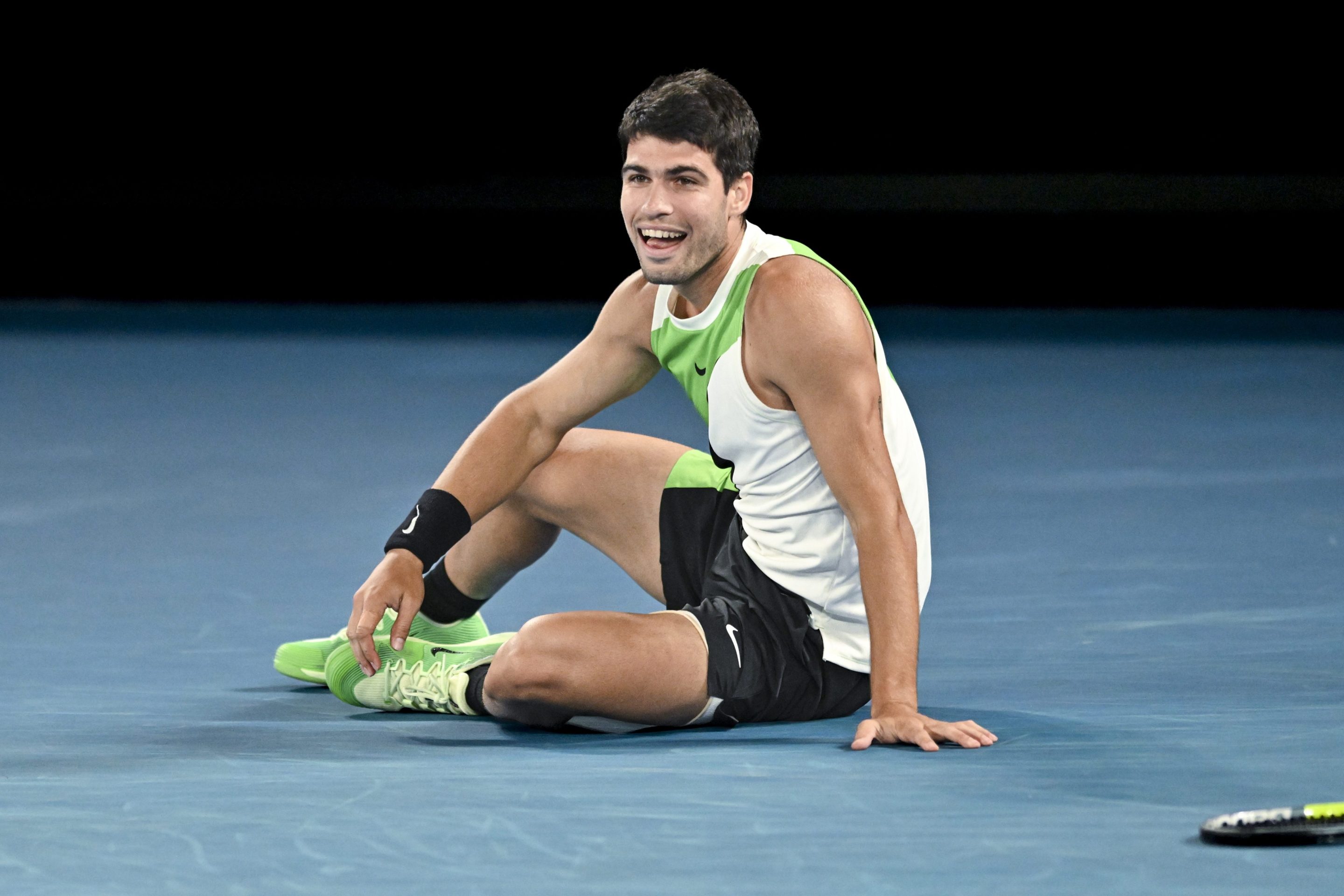The good thing about hinging some degree of your mental health on working out is that you can almost always exercise; the bad thing about hinging some degree of your mental health on working out is that you can almost always exercise.
This story of hubris starts in January, when I was climbing in the gym and my finger—and this is not a medical term, but it is the most accurate way I can describe the process—exploded. Perched near the top of the wall, my left hand curled around a sloping hunk of white plastic and my right pulling hand on a wallet-thick crimp oriented sideways, I unmoored my left to swing it over to a larger white hold, bearing all my body weight for a long second or two on my tensed right hand. The tension violently and suddenly resolved itself: By which I mean a tendon in my right ring finger snapped.
It sounded like a gunshot, and even through headphones, I could hear the sound. Imagine a violin string severed by a cleaver, a rubber band pulled taut until it erupted, a large needle dropped onto a plate of ice. My friend Austin on the ground about 20 feet away heard the meaty pop, and he rushed over to make sure I was fine. I don't remember what he said, as I was in shock and breathing all crazy, but I remember his almost unnervingly calm tone. It was neither concerned nor conciliatory. His tone was almost stern, conveying You will come back from this, spoken by someone who had done so.
The technical term for what I think I had was a Grade IV strain to my A2 pulley, though there was no point in confirming that or seeking medical attention, since surgery isn't a real option and there's nothing you can do beyond sit around and wait for your finger to knit itself back together. This sort of injury is almost banal in the climbing world. The thing that makes the sport good is the progression, seeking out and overcoming continually harder challenges.
It is also very easy to track what progress means, as each climb is assigned a grade. If you want to move up from crushing V4s to putting down V6s, you have to be able to do harder moves, to be stronger, to risk more. You also have to be willing to accept the attendant physical toll and higher risk of injury. The worst injuries I've gotten climbing—bad concussion, bicep strain, "shoulder stuff"—have all been the product of me going too hard trying to hunt a higher grade. As I wrote last year, I'm very motivated by competing with myself. That's the operative tension of the sport. You have to push yourself; pushing yourself makes it more likely that one of your ring fingers will explode.
The trick is in how you define what pushing yourself means, which is something I had wrong. I thought that to progress was to suffer, that competing with yourself meant somehow defeating a lesser version of yourself. After dutifully following a monastic recovery plan for three months, I was too obsessed with climbing the progression ladder again to stay at home any longer. I was working out in other ways, but without the tangible, direct sense of progress offered by climbing, I felt mildly unsettled. Lowering my mile time or lifting a slightly larger stack of weights offered none of the expressive joy of climbing. A key part of the sport is its inherent creativity. You are given a series of holds, or rock knobs. How you ascend them is up to you, and as someone who is taller, I'm forced to operate in different ways than most people. I relish finding ways to break the conventionally accepted best practices, in problem-solving my way to a novel solution.
So, with a complex tape-job on the finger, I got back on the wall. You apparently have to learn some lessons twice, though the way this was communicated to me by the Climbing Gods was not by re-tearing the same pulley, but by unmooring the tethers holding my left middle finger together. It was nothing as spectacular, merely an overcompensation injury, the product of climbing before fully being able to trust my freshly knit-up tendon. I had put my head down for months, awaiting the promise of more time on the crag, only to push too hard too soon. I was competing with myself and trying to win.
Sometime during my second multi-month layoff, now nursing two frayed tendons, I realized that the point is not self-annihilation through competition. That was basically something I had accomplished, and it was painful and degenerative. I had competed with myself and lost, and the result of all that straining was a mangled finger on each hand—in other words, an imbalance. The only way to actually improve is to keep doing what you are doing. Stilted out of that harmony, I realized that what I liked was not accomplishment, but the act itself.
In other words, instead of competition I realized what's important to aim for is something closer to self-collaboration. You cannot compete with yourself and win; there is no endpoint satisfying enough for this mindset. Taken to any number of logical extremes, you will find yourself injured, bitter at the impossibility, or sheering off other parts of your life in tribute to the obsession. What I had to learn painfully, twice, is that true victory is in being able to keep competing.
A year later, and I'm climbing at a higher level than when I tore my shit a year ago. There is a kind of victory in that, but one that comes through time and considered effort. I still tape my fingers when I climb, and that ritual reminds me every time: The goal is not to win today, but to try again tomorrow.






